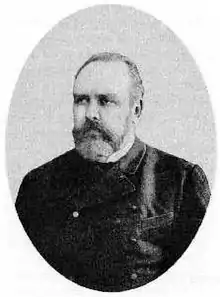Ivan Yarkovsky
Ivan Osipovich Yarkovsky (Polish: Jan Jarkowski) (24 May 1844, Asveya, Vitebsk Governorate – 22 January 1902, Heidelberg) was a Polish Russian[1] civil engineer. Born from a Polish family in Asveya (Russian Empire, now Belarus), he worked for a Russian railway company and was obscure in his own time. Beginning in the 1970s, long after Yarkovsky's death, his work on the effects of thermal radiation on small objects in the Solar System (e.g., asteroids) was developed into the Yarkovsky effect and the YORP effect, thanks to his rediscovery by Estonian astronomer Ernst J. Öpik. The asteroid 35334 Yarkovsky is named in his honour †. In 1888, he also created a mechanical explanation of gravitation.

Ivan Yarkovsky
References
- Beekman, George (2005). "The nearly forgotten scientist Ivan Osipovich Yarkovsky". Journal of the British Astronomical Association. 115 (4): 207.
Literature
- Yarkovsky, I. O. (1888), Hypothese cinetique de la Gravitation universelle et connexion avec la formation des elements chimiques, Moscow
- Beekman, George (2006), "I.O. Yarkovsky and the Discovery of 'his' Effect", Journal for the History of Astronomy, 37: 71–86, Bibcode:2006JHA....37...71B
This article is issued from Wikipedia. The text is licensed under Creative Commons - Attribution - Sharealike. Additional terms may apply for the media files.